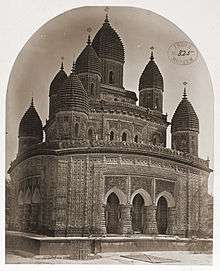Kantajew Temple
| Kantajew Temple | |
|---|---|
|
| |
| Name | |
| Other names | Kantanagar Temple |
| Geography | |
| Country | Bangladesh |
| State | Rangpur Division |
| District | Dinajpur |
| Culture | |
| Primary deity | Kantaji (Krishna)[1] |
| Architecture | |
| Architectural styles | Nava-ratna |
| History and governance | |
| Date built | 1722 CE[2] |
| Creator | Raja Ramnath |

Kantanagar Temple, commonly known as Kantaji Temple or Kantajew Temple (Bengali: কান্তজীউ মন্দির) at Kantanagar,[1] is a late-medieval Hindu temple in Dinajpur, Bangladesh. The Kantajew Temple is one of the most magnificent religious edifices belonging to the 18th century. The temple belongs to the popular Hindu Kanta or Krishna and this is most popular with the Radha-Krishna cult (assemble of memorable love) in Bengal. This beautiful temple is dedicated to Krishna and his wife Rukmini. Built by Maharaja Pran Nath, its construction started in 1704 CE and ended in the reign of his son Raja Ramnath 1722 CE,[2] during the reign of his son Maharaja Ramnath.[3] It boasts one of the greatest examples on Terracotta architecture in Bangladesh and once had nine spires, but all were destroyed in an earthquake that took place in 1897.[4]
Architecture
The temple was built in a navaratna (nine-spired) style before the destruction caused by the earthquake of 1897. The characteristic features of the erections are the four centered and wide multi-cusped arches, the plastered surface of the walls having immense rectangular and square panelings, prominence of the central archway and the central mihirab by making the slightly larger and setting in a projected fronton in the outside directions, the use of ornamental turrets on the either side of the fronons, the semi-octagonal mirirab apertures,the archway opening under half-domes, the Persian muquarnas work in stucco inside the half-domes over the entrance arches and mihirab niches,the bulbous outline of the domes with constructed necks, domes on octagonal drums with lotus and kalasa finials as the crowning elements, the round pendentives to make up the phase of transition for the domes and the multi-faced corner towers rising high above the horizontal merloned parapets.[2]
Gallery
-
-
Terracotta designs near the entrance
-
Terracotta designs outside the temple
-

Description of the temple
-
See also
- Architecture of Bangladesh
- Bagha Mosque
- Khan Mohammad Mridha Mosque
- Saat Masjid
- Shona Mosque
- Sixty Dome Mosque
References
- 1 2 Ghosh, P. (2005). Temple To Love: Architecture And Devotion In Seventeenth-Century Bengal. Indiana University Press. ISBN 978-0-253-34487-8.
- 1 2 3 ABM Husain,. Architecture: a History Through the Ages. Asiatic Society of Bangladesh. LCCN 2008419298. OCLC 298612818. (pg; 243)
- ↑ Nazimuddin Ahmed. "Kantanagar Temple". Banglapedia: National Encyclopedia of Bangladesh.
- ↑ Journey plus - Dinajpur.
External links
| Wikimedia Commons has media related to Kantanagar Temple. |
Coordinates: 25°47′26″N 88°40′00″E / 25.79056°N 88.66667°E
